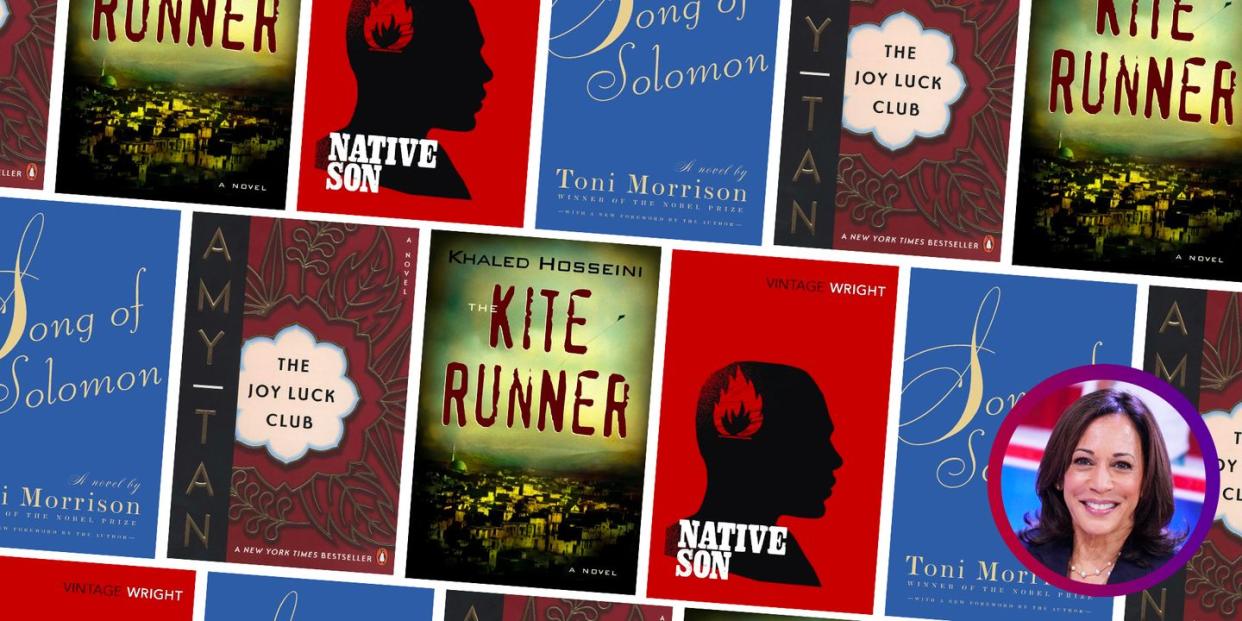Sen. Kamala Harris Shared Her Favorite Books and You'll Want to Read Them All

- Oops!Something went wrong.Please try again later.
Sen. Kamala Harris is officially Joe Biden's running mate for the 2020 presidential election.
Last fall, Harris shared her five favorite books with Book Riot, along with other Democratic presidential candidates like Pete Buttigieg and Elizabeth Warren.
From Toni Morrison to Amy Tan, here are a few of Kamala Harris's favorite books and authors.
Having excellent taste in books is not a prerequisite for becoming vice president of the United States. It just so happens that Sen. Kamala Harris, recently announced as former Vice President Joe Biden's running mate, does have an impeccable eye for good reads, however subjective that statement is—and we have proof.
Last year, Book Riot asked the crowded field of Democratic presidential candidates to select their favorite books, in a similar vein to President Barack Obama's annual list of book and pop culture recommendations. Cory Booker's included The Fire Next Time by James Baldwin and Just Mercy: A Story of Justice and Redemption by Bryan Stevenson; Pete Buttigieg revealed he wrote his college thesis on The Quiet American by Graham Greene.
Unfortunately, Biden didn't provide a list of favorite books—but we do know Harris's favorites, and they're good. She chose a wide range of narratives from authors of all backgrounds, including a book by Toni Morrison, a family saga perfect for book clubs, and a timeless children's book. Think of Harris's five favorite books as a woke curriculum, perfect for reading while in quarantine.
Here's what you should read next, if you want to go by Harris's recommendations.
Song of Solomon by Toni Morrison
Of Toni Morrison's 11 novels, nine non-fiction works, five children's books, and two short stories, Song of Solomon is Kamala Harris's favorite. Chosen as an Oprah's Book Club Pick in the '90s, Song of Solomon is about the eventful life of Macon "Milkman" Dead III, a Black man living in Michigan.
At Toni Morrison's memorial service in late 2019, Oprah paid homage to the late author, who passed away last August at the age of 88. As Oprah said, Song of Solomon, along with the rest of Morrison's work, "refuses to be skimmed," and demands close attention.
The Kite Runner by Khaled Hosseini
There's a good chance you've already read The Kite Runner, if not just heard of it. Published in 2003, The Kite Runner was a New York Times bestseller for over two years.
The Kite Runner is written with prose that demands you turn the page, even as the story becomes more gruesome. As an adult, Amir is summoned back to his native Afghanistan and is prompted to remember a painful rupture with his childhood best friend, Hassan. The boys' story is set amid a backdrop of Afghanistan's tumultuous history in the '70s.
Native Son by Richard Wright
“The day Native Son appeared, American culture was changed forever,” literary critic Irving Howe once wrote of Richard Wright's dire novel, which illuminates the effects a lifetime of racism have on one man's soul.
Bigger Thomas is not a typical novel hero. Living in poverty in Chicago in the 20s, Bigger accidentally kills a white woman—and, to his surprise, is invigorated. Native Son shows how the conditions of the United States, a place of relentless race-based inequality, turned Bigger into this man.
The Lion, the Witch and the Wardrobe by C.S. Lewis
In this iconic children's book, an ordinary wardrobe is a portal to a magical world. Or rather, a world that was once magical, but now is ruled by an evil queen. With the help of a jolly faun named Mr. Tumnas, the Pevensie children set forth on a quest to restore leadership to Narnia.
Published in 1950, The Lion, the Witch and the Wardrobe defies classification. It's a fantasy novel, but can also be read as a Christian allegory, or even a story about political leadership and systems of governance, as Narnia changes leadership over the years. Most importantly, it's a novel with a meaning that will change as you revisit it over the years.
The Joy Luck Club by Amy Tan
One of the all-time great novels about the immigrant experience, The Joy Luck Club measures the divide between immigrants and their first-generation kids—and how it's possible to close that divide, through conversation.
Amy Tan's novel follows four sets of mothers and daughters living in San Francisco. The mothers, all immigrants from China, bond over their weekly mahjong games; their daughters bond over their shared experiences of living between cultures. Unwind with the sumptuous movie adaptation afterwards.
For more stories like this, sign up for our newsletter.
You Might Also Like

